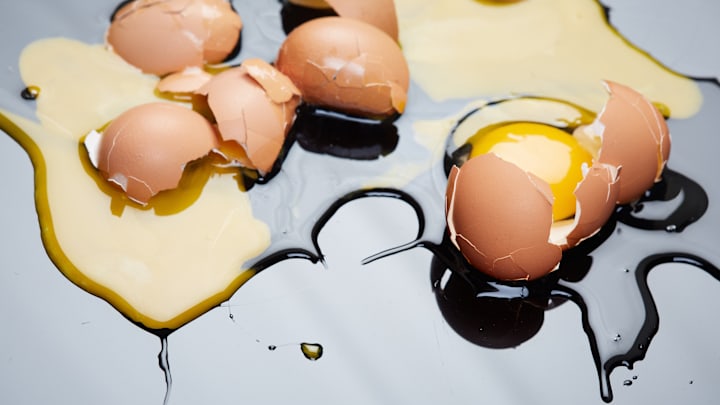Prices for eggs continue to hit record highs, adding pressure to cash-strapped shoppers as they head into Easter holiday planning.
In the face of rising costs, simple everyday stressors—like accidentally dropping an egg on the ground—can feel a lot more frustrating. Beyond just causing delays during your next baking project, that broken egg might spill into a real hassle once it comes time to clean everything up, especially if all that slime spreads and those bits of cracked shell end up sticking to the floor.
Help is on hand, however, thanks to this time-tested trick that gets used a lot in restaurants when the yolk starts to spill. If you’re in a hurry (like cooks and waitstaff typically are when they’re in the back of the house), this quick cleaning hack can help you make short work of that runny mess. Not only that, but below are tips for how to clean egg spills on different types of flooring, plus what to do if you wait too long to clean up after a kitchen mishap.
- Salt Is Your Friend—but Why?
- How to Clean Up Egg Spills on Rugs and Carpets
- What Should You Do if the Egg Has Already Hardened?
Salt Is Your Friend—but Why?
The go-to method used in restaurants to clean up after a gooey egg spill? It’s simple: just grab some salt.
Though it might seem unlikely, salt—which is already ubiquitous in most kitchens—is actually one of your best allies when it comes to dealing with all that slippery gunk. This is because table salt helps to draw out the liquid content in eggs via osmosis. In doing so, salt helps to thicken up the spilled egg yolk and assorted muck, making it easier to eventually wipe up.
Simply sprinkle a good dose over your cracked eggs and leave it to sit for a few minutes. Once it’s been left to do its job for a bit, you’ll find that the goo has congealed into something more solidified, allowing for much easier removal with a paper towel, cloth, or sponge.
How to Clean Up Egg Spills on Rugs and Carpets
While salt can be great for tackling egg spills on hard, flat surfaces, you’ll need to take a different approach when it comes to rugs and carpets.
Because rugs and carpets are highly absorbent and full of crevices, the usual trick of using salt—or another thickening agent, like baking soda or cornstarch—doesn’t quite apply. But don’t fret, because there’s another clever cleaning aid for broken eggs you might already have lurking in your fridge or cupboard, and it’s almost as easy to find as salt.
With club soda, you can get similar results as you would with the salt, just on a different surface. The first thing you’ll need to do is scoop up as much of the egg as possible—a spatula and spoon will do fine for this. Then, you’ll need to grab some of that club soda and pour a generous amount onto the spill. The liquid’s abrasive and acidic properties do an excellent job of prepping the area for dabbing up the remaining gooey mess with a paper towel or sponge.
What Should You Do if the Egg Has Already Hardened?
Say you find yourself in a situation where you’re cooking on a stovetop and you just weren’t able to clean that egg spill up in time before it hardened. Then what?
While salt helps to do the trick when that broken egg is still all sticky and slimy, you need to take a slightly different approach once the egg has already solidified. Hardened eggs need moisture put back into them. To do this, drape a wet cloth or paper towel over the spill zone, once the stove has cooled down. Then, you should leave it for approximately 10 minutes. This will allow some liquid to transfer back to the eggs, making them much easier to scoop up after that time is up.
In general, you should aim to wipe down the surface area after you’ve cleaned up an egg spill and do it with a wet sponge or paper towel. Using soapy water can be a good way to get rid of any surface-level stickiness. That said, scrubbing down with apple cider vinegar can also be an effective way to eliminate unwanted smells and get the job done.
Read More Kitchen Hacks Below:
